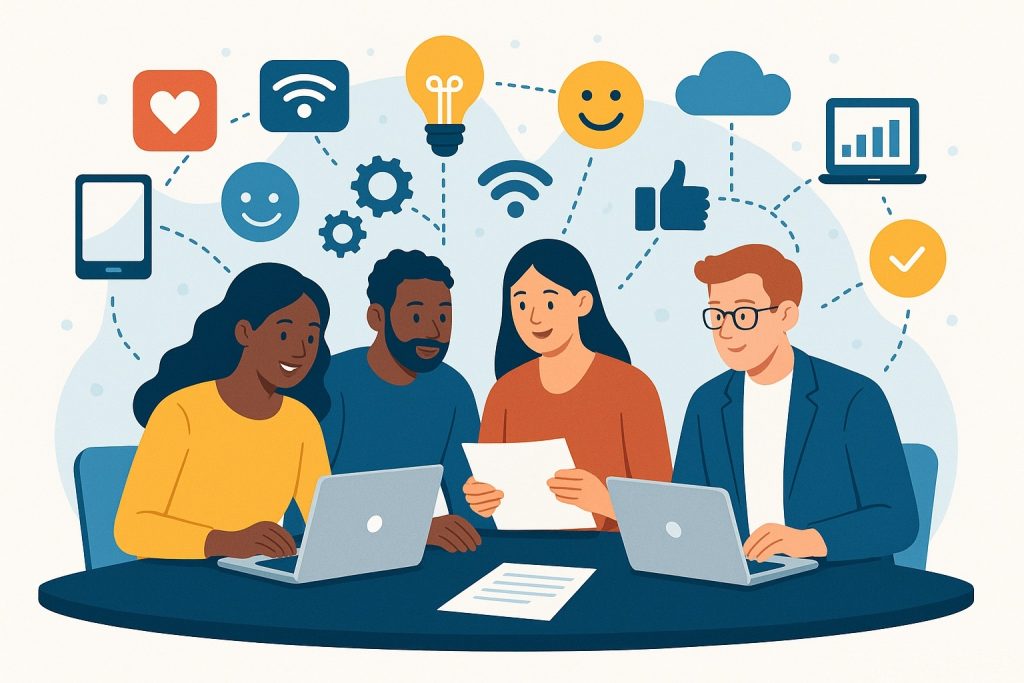🤖 Welcome to the AI Era—But Something’s Missing
In today’s workplaces, AI can scan thousands of resumes in seconds, analyze employee behavior patterns, and even conduct initial interviews. Sounds futuristic, right?
But here’s a critical question every HR professional must ask:
Can AI truly understand people?
The honest answer is no. That’s where Emotional Intelligence (EQ) steps in—not just as a soft skill, but as a strategic superpower for HR leaders.
While technology automates tasks, EQ humanizes the workplace. In a world of algorithms and automation, it’s emotional intelligence that builds trust, drives inclusion, and creates meaningful employee experiences.

Let’s dive into why EQ is essential for modern HR—and how to build it.
💡 What Exactly Is Emotional Intelligence?
Emotional intelligence, or EQ, isn’t just about staying calm or being friendly.
It’s the ability to recognize, understand, and manage both your own emotions and those of others—especially under pressure.
✅ The 5 Core Components of EQ:
- Self-Awareness—Recognizing your own emotions and their impact on decisions
- Self-Regulation—Managing stress, impulses, and reactions professionally
- Motivation—Acting with purpose, not just for rewards
- Empathy—Understanding others’ emotions without judgment
- Social Skills – Navigating relationships and resolving conflicts effectively
EQ isn’t just a “nice to have.” In HR, it’s the foundation of leadership, culture, and communication.
⚙️ AI Is Powerful—But It’s Not Human
AI has transformed HR:
- Automating admin tasks
- Reducing bias in screening
- Enhancing data-driven decisions
Yet, AI has no emotional depth. It can’t feel, listen between the lines, or understand context like humans do.
That’s where EQ becomes the missing link in “Smart HR.”
🔍 5 HR Scenarios Where EQ Outperforms AI
1. Empathy Can’t Be Automated
AI might detect a drop in productivity. But it won’t notice that the employee is going through grief, burnout, or personal struggles.
✅ Only a human with EQ can sense unspoken distress — and respond with care.
2. Conflict Resolution Needs Compassion
Disputes are part of every workplace. AI can log complaints, but it can’t navigate tension with emotional sensitivity.
✅ EQ enables HR to listen actively, mediate fairly, and rebuild trust.
3. Leadership Is More Than Performance Metrics
Promoting someone based solely on KPIs might overlook toxic behaviors or lack of empathy.
✅ EQ helps HR identify true leaders—those who inspire, support, and connect with people.
4. Inclusion Is More Than a Checklist
Diversity can be tracked in spreadsheets. Inclusion lives in feelings of safety, belonging, and respect.
✅ EQ creates emotionally safe environments where all voices are heard and valued.
5. Change Management Requires Heart
Layoffs, restructures, and policy shifts are common. How HR delivers the message defines how people experience the change.
✅ EQ ensures transitions are handled with empathy, transparency, and respect.
📊 The Business Value of EQ in HR
Emotional Intelligence doesn’t just make people feel good — it drives real results:
- ✅ 90% of top performers have high EQ
- ✅ EQ-led teams are up to 20% more productive
- ✅ Organizations with emotionally intelligent leadership report higher retention and lower burnout
In an AI-powered HR world, EQ becomes a competitive advantage — not just a soft skill.
🧠 Can HR Professionals Develop EQ? Absolutely.
EQ isn’t fixed — it can be learned, practiced, and strengthened. Here’s how:
✔️ Practice Active Listening – Pay attention not just to words, but tone and body language
✔️ Pause Before Reacting – Especially in emotionally charged moments
✔️ Ask Better Questions – Use open-ended questions to foster dialogue
✔️ Reflect on Feedback – Embrace feedback as a growth opportunity
✔️ Stay Mindful – Awareness of self leads to better awareness of others
🎯 The more emotionally intelligent you become, the more impact you’ll have — as an HR leader and as a human being.
🤝 AI + EQ = The Future of Human-Centered HR
Let’s stop treating AI and EQ as opposites. The future of HR lies in the synergy of both.
📌 Example:
- AI detects a decline in engagement.
- An emotionally intelligent HR leader opens a meaningful conversation and uncovers burnout — leading to real support.
Together, AI gives us the data. EQ gives us the wisdom.
🔚 Final Thoughts
The HR landscape is evolving fast. Automation is here to stay — but connection remains king.
As we master tools, dashboards, and predictive algorithms, let’s not forget the most timeless tool we have: emotional intelligence.
In every policy, promotion, or performance review — EQ is what turns processes into people-first experiences.
Because at the heart of every thriving workplace…
is someone who truly understands hearts.
